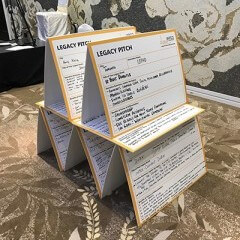“It’s easy to take a conference to any destination, but sometimes you don’t leave a mark,” said Olivia Galun, IAPCO’s secretariat. “We want to give something back to a destination and make it valuable.”
Thinking about how to leave that kind of mark involves many considerations, according to Medhat Nassar, CEO of Dubai-based Meeting Minds – Experts, an IAPCO member, which organized IAPCO 2017. “When you’re trying to consider the legacy of the meeting, you have to take the culture into consideration,” Nassar said.
“There might be a gap in need of filling in a specific sector. The leading experts attending these meetings can help develop a roadmap for filling that gap.”
At IAPCO 2017’s legacy session, attendees split into eight teams of about eight people each to brainstorm a legacy that a specific conference might leave in a specific host city. Each team was given the name of an association and its overall purpose, as well as a destination and event. A “fact pack” provided details about the destination, including demographics, details on past legacy events, and key social issues there. Teams were asked to create compelling meeting legacies — and encouraged to think outside the box to pinpoint something sustainable and memorable that would make a lasting difference. They had 30 minutes to brainstorm and create a pitch board to display their legacy concept, then two minutes to present to a panel of judges.
The winner of the challenge was a group that had been assigned Toronto and the World Environmental Education Network, and proposed a fundraising “Walk for Freedom” from Toronto to Mexico to raise awareness about environmental issues. Another group was assigned Hong Kong and the World Congress on Lower Back Pain. Their proposed legacy was to create a dance — performed in the IAPCO session — that showcased moves to help prevent lower-back issues. The group’s idea was to film the dance and promote it on social media.
A third group was assigned Dubai and the International Brain Injury Association (IBIA). They devised a plan to build a permanent brain-shaped meeting venue in the health-care area of IBIA’s exhibit hall. This meeting area would include information about brain injury and would provide an educational element to any future gatherings held in the space. “It was really interesting,” Nassar said, “having contributions from people from all over the world.” 
But IAPCO wasn’t just simulating legacy brainstorming. Its 2017 conference created its own legacy that was directly tied to the culture and goals of the United Arab Emirates. In past years, the UAE has created a series of initiatives aimed at driving innovation and knowledge throughout the region. The year 2015, for example, was known as the year of innovation, and public and private efforts were launched to create leaders in this area. The theme for 2016 was reading, in an effort to enhance intellectual capacity.
Playing o that, IAPCO 2017 organizers asked attendees to each bring a business, meetings-related, or personal- development book with them to Dubai — a book that was an inspiration or a catalyst for success. IAPCO collected nearly 100 books and donated them to the library at the Emirates Academy of Hospitality Management (EAHM).
The organization hopes to measure the return on this legacy by maintaining close contact with EAHM and tracking how many times the books have been checked out of the library. IAPCO also plans to meet with the school’s event-management students to find out what they learned from the books and what ideas they inspired. “A legacy should have a lasting impact on the community,” Nassar said. “We want to make sure there is a return on our investment.”


